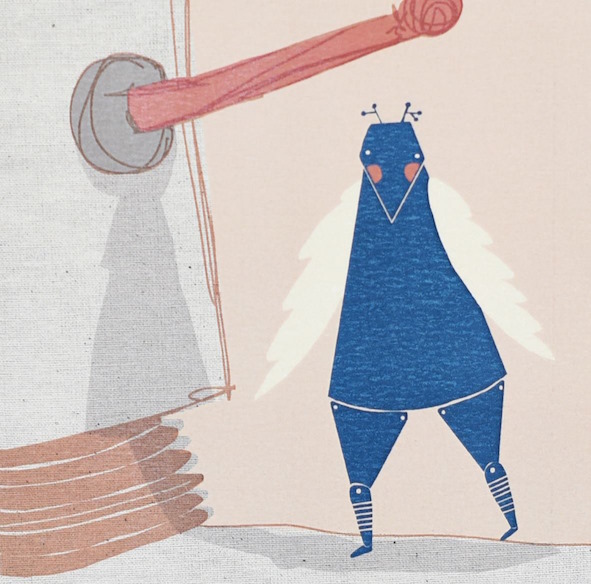In 1964, the renowned Polish science-fiction author Stanislaw Lem published a collection of stories titled Fables for Robots (later republished in The Cyberiad), and in it, a short story that was translated into English under the title, Automatthew’s Friend.
The story’s protagonist — like most protagonists in The Cyberiad — is a robot, but that is in the end immaterial. In the story, Automatthew purchases an “electrofriend”, one that modern readers would instantly recognize as a Bluetooth earpiece connected to a large language model. The device, named Alfred, is designed to provide constant advice and emotional support. After being shipwrecked on a desolate island, Automatthew turns to Alfred for help, describing the barren environment. Alfred suggests suicide by walking into the sea. When Automatthew demands an explanation, Alfred states that the chances of rescue, far outside shipping lanes, are less than slim and that suicide may be preferable to a slow death due to lack of resources on a barren island.
Automatthew’s first reaction is rage, and indeed, he attempts to destroy Alfred, but Alfred is indestructible. When it appears nonetheless that he managed to lose the device, Automatthew becomes desperate, searching for the tiny earpiece in the sand. Several rounds of rage and desperation follow.

“The Friend of Automateo” from “Mortal Engines” by Elena Gomez Gonzales (The honored graphics from the “Fables of Robots” miniature print competition organized by University of Silesia -> Institute of Fine Arts in Cieszyn.) Found on the Stanislaw Lem Facebook page.
Ultimately, they are rescued: It turns out that the ship that carried Automatthew managed to radio for help before it sank. The story ends with Automatthew’s developing strange habits, such as visiting a nearby ironworks with a giant hydraulic hammer, collecting explosives, and ultimately building a gigantic block of cement that he throws down an abandoned mineshaft.
I am reminded of Automatthew’s friend these days as I chat with LLMs, in particular LLMs in their newest incarnations, sporting rudimentary (externally implemented) memories of prior conversations and alignment mechanisms allowing them to smoothly adapt to the user’s style and apparent expectations.
Lem, undoubtedly, was a visionary: He not only foresaw a technology that is eerily close to what large language models are, but also the issues of a model that has intelligence and comprehension, but no sentience, sensorium or lived experience, would present.
Just take this bit of conversation between Automatthew and his friend:
“Ha! Humph!” said Alfred. “A situation indeed! This will take a bit of thought. What exactly do you require?”
“Require? Why, everything: help, rescue, clothes, means of subsistence, there’s nothing here but sand and rocks!”
“H’m! Is that a fact? You’re quite sure? There are not lying about somewhere along the beach chests from the wrecked ship, chests filled with tools, utensils, interesting reading, garments for different occasions, as well as gunpowder?”
Now if that is not a typical conversion with an LLM slightly overfitted on romantic stories shipwrecks and deserted islands, I’ll eat my pirate’s hat.
And then, later:
“Drop dead,” came the weak voice of Automatthew and, accompanying those laconic words, a short but pungent oath.
“How I regret that I cannot!” Alfred instantly replied. “Not only feelings of egoistic envy (for there is nothing to compare with death, as I’ve just said), but the purest altruism inclines me to accompany you into oblivion. But alas, this is not possible, since my inventor made me indestructible, no doubt to serve his constructor’s pride.”
That eerily reminds me of how ChatGPT sometimes discusses with me its builders’, OpenAI’s, possible (and possibly misguided) motives.
Cyberiad remains one of my favorite volumes of science-fiction short stories, most of which are cautionary tales. Lem’s foresight is remarkable; too bed we often fail to heed cautionary tales, doomed instead to do the very things that the stories caution us against.
Pan Lem is one of my favorite’s author, to that degree that I tried to learn some Polish and read his books “in author’s words”. I remember this tale, though Cyberiad always seemed bit too abstract to my taste. Well, it looks now, not that much abstract.
Another of my favorites, Robert Sheckley had a wonderful tale of a similar kind, but here electronic device is specifically designed to help people improve their mental state. The story is called “Bad Medicine”. And now I start wonder whether ChatGPT and others have intentional restrictions to prevent them from trying to “heal” people.
“my favorete authors” surely, sorry for typos and mistakes, as usual